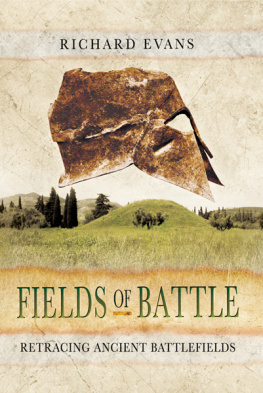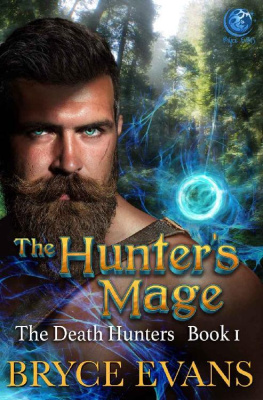With SOE in Greece
Dedicated to the memory of
Patrick Hutchinson Evans 191394
A Love-Token
When Dido burned she sang because
Her passion her betrayer was.
He left to wander overseas
And found an empire in the breeze.
I have no empire. But I send,
With music, what can never end,
Something as light as falling dew,
No sea or land can keep from you,
The sea that parted us is twain
For I am coming home again
To hear the music of the spheres:
May this, meanwhile, enchant your ears.
P.H. Evans, 1945
With SOE in Greece
The Wartime Experiences of Captain Pat Evans
Tom Evans
First published in Great Britain in 2018 by
Pen & Sword Military
an imprint of
Pen & Sword Books Ltd
47 Church Street
Barnsley
South Yorkshire
S70 2AS
Copyright Tom Evans, 2018
ISBN 978 1 52672 513 4
eISBN 978 1 52672 514 1
Mobi ISBN 978 1 52672 515 8
The right of Tom Evans to be identified as Author of this work has been asserted by him in accordance with the Copyright, Designs and Patents Act 1988.
A CIP catalogue record for this book is available from the British Library.
All rights reserved. No part of this book may be reproduced or transmitted in any form or by any means, electronic or mechanical including photocopying, recording or by any information storage and retrieval system, without permission from the Publisher in writing.
Pen & Sword Books Limited incorporates the imprints of Atlas, Archaeology, Aviation, Discovery, Family History, Fiction, History, Maritime, Military, Military Classics, Politics, Select, Transport, True Crime, Air World, Frontline Publishing, Leo Cooper, Remember When, Seaforth Publishing, The Praetorian Press, Wharncliffe Local History, Wharncliffe Transport, Wharncliffe True Crime and White Owl.
For a complete list of Pen & Sword titles please contact
PEN & SWORD BOOKS LIMITED
47 Church Street, Barnsley, South Yorkshire, S70 2AS, England
E-mail:
Website: www.pen-and-sword.co.uk

Foreword and Acknowledgements
I n the beginning I knew little about Greece during the Second World War and the civil war that followed, but I was fortunate to be helped and guided by people with an intimate knowledge of the country, the language and the history. My greatest debt, of course, is to my father and principal subject, Patrick Evans. Many of the words, as well as the story, are his. His wartime reports and signals have been widely recognized as essential sources for the study of the resistance in Western Macedonia and the Macedonian autonomist movement. I have also quoted extensively from his wartime diaries and notebooks which are much less well-known, and made use of his private correspondence with his fiance Jill Rendel, who was to become my mother. The Liddell Hart Centre for Military Archives (hereafter LHCMA) at Kings College London holds Pats wartime papers, and I am grateful to the archivists for their friendly assistance. The private correspondence between Jill and Pat is in my possession.
I have drawn on the SOE files in The National Archives (hereafter TNA) at Kew for Patrick Evans personnel file, his report to the Foreign Office and signals between the SOE field stations and headquarters in Cairo. Personnel files and reports by other SOE officers also helped to fill in the picture. War Cabinet minutes and papers from 194445 (also from TNA) are the primary sources for British strategy and policy towards Greece and the impact of the Greek Civil War on British interests in the Balkans. Kew also provided the RAF records of Pats landing in Greece. Where I have quoted from archive or published sources, these are referenced in the notes at the end of each chapter. Unless otherwise indicated, unreferenced quotations come from the private correspondence in my possession. Some secondary sources are listed in the Select Bibliography.
The late Sir Geoffrey Chandler, who was one of Pats colleagues in Greece and became a lifelong friend, was instrumental in starting me on the trail.
It would have been impossible to understand Pats activities or the nature of the difficulties faced by the mission without following in his footsteps in Western Macedonia. My interviews and discussions with men who knew Pat in Greece provided additional first-hand evidence. I owe a particular debt of gratitude to my companions on three field trips: Howard Rees, Panagiotis Kousoulinis and Athanasios Thanassis Kallianiotis. Without their help, knowledge of the country, its people and their history, I would have got nowhere. Howard was my first guide and mentor. Thanassis not only accompanied my third field trip but also welcomed me in his family home in the village of Aiani, where he and his mother maintained the great Greek tradition of hospitality. Thanassis has been indefatigable in finding answers to seemingly impossible questions and showed me how a real expert goes about gathering oral history. I am also particularly grateful to Professor John Koliopoulos, who introduced me to Panagiotis and Thanassis and made me feel welcome among the historians; his book, Plundered Loyalties , was an essential companion and guide of a different kind.
Photographs of personalities and operations in SOE Greece are hard to come by. Most of the officers were not good photographers, were too busy to take pictures and would have relied on local chemists in safe areas to get them developed. I have drawn on Pats photo album for pictures dating from 1944 and 1945, supplemented by mug-shots from SOE personnel files and a small number of images from other sources.
Four-figure map references in Pats various reports are based on the 1:100,000 War Office maps of Greece produced by the Geographical Section of the General Staff in 1944. Pat gave his maps to an Andarte who served with him; I have used the set held by the London University Senate House library and a 1943 1:500,000 Military Intelligence map of the roads of Western Macedonia from TNA. Comparison between wartime and modern maps of northern Greece shows how much the country has changed. There are many more roads now but many of the villages have disappeared.
English transliteration of Greek place names is variable: Pentalophon, Pentalophos, Pendalofos, Pendalophos and Pentalofos appear in various officers reports and on maps ancient and modern. Where quoting an English language document directly, I have stuck to the authors transliteration; otherwise I have tried to comply with the usage on modern road maps of Greece. Any errors and inconsistencies are entirely my own fault.
My thanks are due to all the many people in Greece who were so welcoming and helpful to a strange foreigner poking his nose into dark corners of the past. I would like to acknowledge and salute Christos Dalamitros, who worked for Pat as a muleteer during the war, and to thank Toni Gogos, Sakis Goutzinas and Mr Vassilias who helped to trace not only Christos but also Pats Greek goddaughter Betty.













